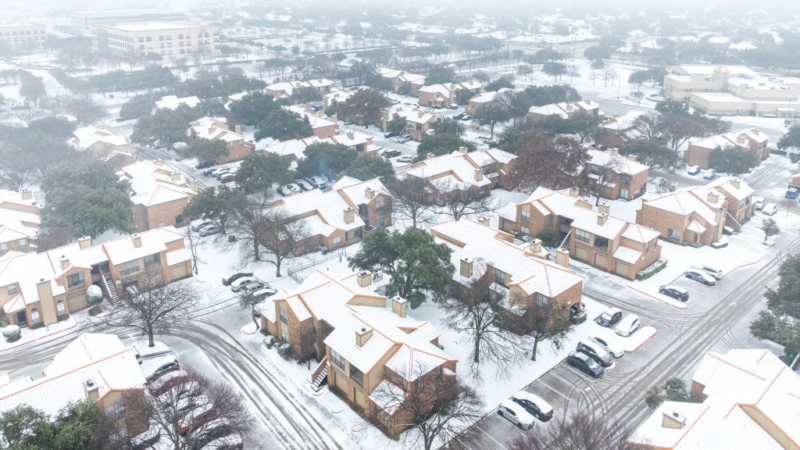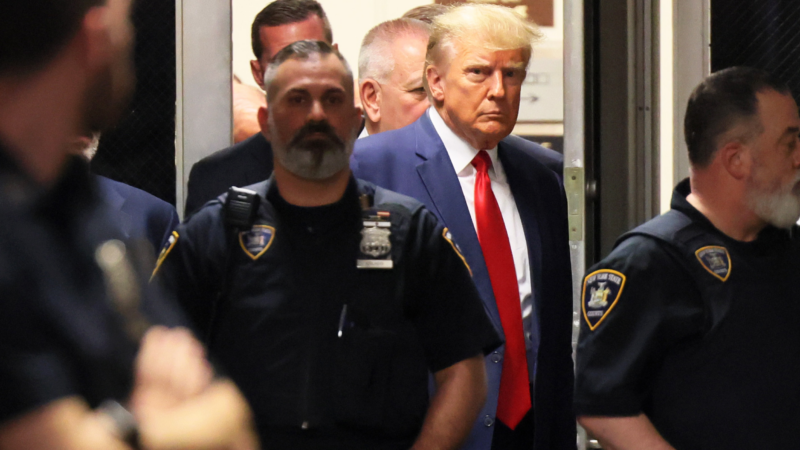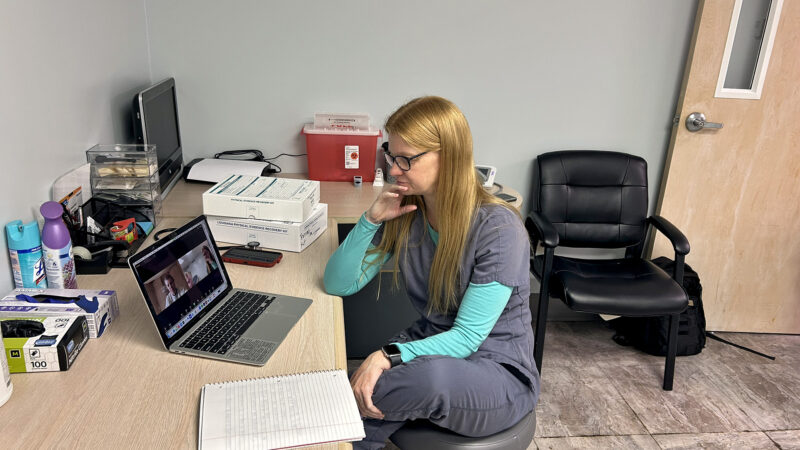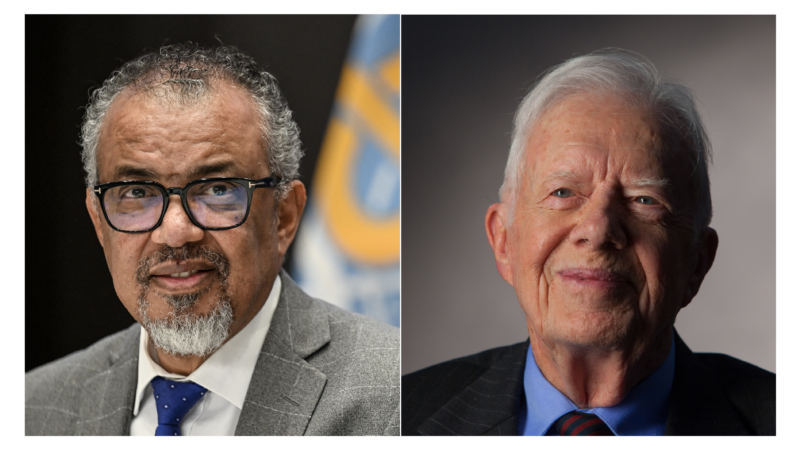‘Dune: Prophecy’ series tackles how women view and wield power
Women and how they wield power are at the center of HBO’s new series Dune: Prophecy, a prequel to the epic first imagined by Frank Herbert in the 1960s.
The six-episode season, debuting Sunday on Max, tells the origin story of the matriarchal order later known as the Bene Gesserit, 10,000 years before the rise of messianic figure Paul Atreides. “We like to call it 10,000 years B.C. — before (Timothée) Chalamet,” jokes Emily Watson, who plays the group’s leader, Mother Superior Valya Harkonnen.
“We’re part of this sisterhood that is trying to direct humanity on the right path.” The Oscar nominee spoke with NPR’s Michel Martin during a recent visit in New York with other members of the cast and crew.
Power from the shadows
A few decades before the series’ time period, in what’s known in the Dune universe as the Butlerian Jihad, humans barely triumphed over”thinking machines” — computers and other artificial intelligence.

The members of the order — from leaders to the young acolytes they train — advise leaders of the so-called Great Houses, or dynastic seats of power. They pull the strings of power from the shadows, literally whispering into the ears of the men who hold apparent power. They do so discreetly, veiled and dressed in black, while communicating with each other through hand signals.
“As we know from our politics in the U.K., and maybe you might feel in your politics that sometimes it’s not the person at the podium, but the shady characters to one side that you need to keep an eye on,” said SAG Awards nominee Olivia Williams, who plays Valya’s sister, Reverend Mother Tula Harkonnen.
The two sisters grow the order through subtlety and mystique in the fledgling Imperium while fighting against a powerful, terrifying new enemy.
“These women were created by a man in the 60s. And the things that make them frightening to men are the same old stuff: women, in order to be scary, are in a convent, they seem to be in some way chaste… It’s like, what are women getting up to when men aren’t there?” Williams said.
“Part of the sisterhood is that they have to maintain this mystery that freaks men out. Because when you look at the Council of the Imperium, it’s still a bunch of blokes. And that if we need to be isolated in a convent style enclave in order to make men fear us, then that’s what we’ll do as Harkonnen sisters.”

The women in the sisterhood wield superpowers that allow them to tell whether someone is telling the truth. They can also control their bodies on a cellular level to communicate with their ancestors.
“Truth is like a currency. And he who controls that narrative controls the power in the universe,” Watson said. “And it’s ultimately all down to… the Dune equivalent of oil is spice and he who controls the spice controls the universe.”
Decades-old friendship
It’s fitting that Watson and Williams would be cast as sisters. They have known each other for decades, dating back to when they first joined the Royal Shakespeare Company in the U.K. But they had never worked together until now. Williams reflected on how much has changed in her field since she got her first start.

“All those years ago, drama schools took 10 men to two to three women in every year to reflect the proportion of casting once you went out into the business,” she said, while sitting alongside Watson. “And just on the sheer numbers, how astonishing to have two — forgive me Emily, if you object to this term — middle-aged women playing the leads and getting the good lines and the great costumes and the storylines in a major HBO Max TV show.”

One of the ways in which the Harkonnen sisters try to gain power is through a carefully calibrated breeding program. Williams sees parallels with Germany under the Nazi regime and the lead-up to World War II.
“Their motives are appallingly set in the world of eugenics, which is was dreadful when it was was dabbled with in the 1930s in a lot of scientific communities throughout the world, and I don’t look forward to it coming back again to fashion in 10,000 years time,” she said.
“But it’s an interesting study that over the many, many centuries we’re talking, that is still a preoccupation of people. Really, it’s depressing, but I think it’s probably true.”

The Harkonnen sisters may not be ideal female role models, but the complexity of the characters is what Watson calls “a really tasty dish” for an actor. She and Williams drew some of their inspiration from the bloodier chapters of British royal history.
They visited the National Portrait Gallery in London to view portraits of Elizabeth I and Mary, Queen of Scots to try to “get a sense of what that deeply powerful, paranoid complex, born out of violence” character might be,” Watson said.
Williams muses about more reasonable and palatable female protagonists. “What is interesting to me is seeing women who are well and healthily integrated into society and can still be wise and powerful,” she said. “That would be an interesting project.”
The broadcast version of this story was produced by Claire Murashima.
Winter Storm Cora brings cold and snow to the Southern U.S.
A major winter storm is expected to be the biggest in years as cold air moves in from the Arctic bringing snow and frigid temperatures across 20 Southern States.
Trump loses Supreme Court appeal to block hush-money sentencing
This was the only one of Trump's criminal charges to reach and complete a trial, making him the first former or future U.S. president to be convicted of criminal charges.
The Gulf South needs more sexual assault nurse examiners. Is teleSANE the answer?
While some see telemedicine as a useful tool to help provide care to sexual assault survivors, others believe it's not enough to solve the nursing shortage.
Lebanon chooses a new president after two years without one
Lebanon's parliament chose the head of the country's armed forces, Joseph Aoun, to be its next president, a post that's been vacant since October 2022.
Powerful winds fueling the California wildfires are expected through Friday
Red flag warnings are in effect for parts of Los Angeles and Ventura counties, as the National Weather Service warns that powerful winds and low humidity will increase the risk of fire.
World Health Organization head on bond with Jimmy Carter: ‘I consider him my mentor’
The World Health Organization leader worked with Carter for 20 years to fight the world's "neglected" diseases. After attending Carter's funeral, Tedros Adhanom Ghebreyesus shared memories.





